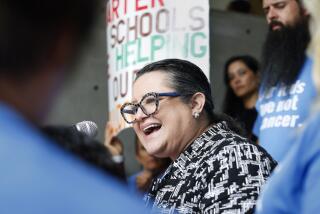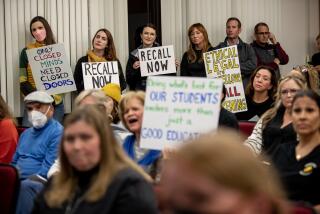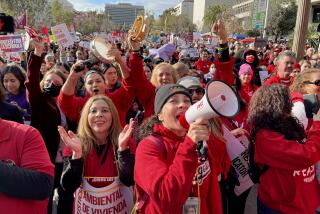Editorial: The L.A. Unified school board has a problem on charters: Ref Rodriguez
Aside from a “not guilty” plea to criminal charges of laundering campaign money, L.A. school board member Ref Rodriguez hasn’t been saying much of anything lately. No response to the allegation that he tried to make $25,000 or so of his own expenditures on his school-board campaign look like they were funded by others. No confirmation or denial of accusations by Partnership to Uplift Communities, the charter-school group he co-founded, and from whose coffers he allegedly transferred $285,000 to separate nonprofits that he controlled without showing how that shift benefited students at Partnership schools.
But silence isn’t cutting it. Rodriguez’s legal woes already are affecting how the school board does its job, especially when it comes to charter schools.
Various charters whose operating agreements are coming up for renewal by the district are rebelling against some of its strict oversight rules, and a group of charter operators has asked the district to reconsider several of its policies. Behind the scenes, though, even allies of charter schools say that the board feels its hands are politically tied. If it gives in to charter schools’ demands, it could be seen as funneling dollars to charter operators even after one of them officially accused a former leader of mishandling large sums of money.
Some of the charter schools’ complaints appear justified, others not. But board members are clearly hesitant to change anything while an ethical cloud hangs over both a prominent charter-school organization and a prominent board member.
Ref Rodriguez should step aside or, if necessary, resign.
In some cases, the board should be making changes. Right now, charter schools located on district-run campuses cannot be guaranteed space there for more than one academic year at a time. Moving from one campus to another is disruptive and expensive; some students won’t follow their school to a new location. L.A. Unified can’t routinely offer long-term leases because it has to accommodate unforeseeable shifts in student enrollment. Still, enrollment is dropping even more precipitously than expected; surely the board could identify some schools that could stay in place for two or three years at a time.
Charter schools also are pushing back at what they call vague and sweeping regulations that the district foists on them. Some of the charters are fighting the wrong battles, such as the one that refused to agree to L.A. Unified rules governing special education students. Its renewal application was rightly rejected by the board. In other cases, the district could do a better job of defining the standards to which it plans to hold charters accountable each year.
Finding a common-sense middle ground would require the board to consider openly and honestly whether the full slate of regulations is in the best interests of students, or whether some of the rules exist only to obstruct charter operators. But these kinds of reasoned discussions about charters are harder for it to accomplish with all the public attention on and charged feelings about the allegations against Rodriguez, whose election in 2015 was a first at L.A. Unified for a charter-school founder.
Happily, the accusations also appear to have squashed, at least for now, the charter schools’ effort to rein in the office of the L.A. Unified inspector general, which audits and investigates school operations. Charter operators complain that investigators go on years-long fishing expeditions without telling them the reasons for the scrutiny. But everyone, including charter supporters, admits that as long as Rodriguez is on the board, it’s politically infeasible to shackle the chief investigator. Board members say the allegations involving the movement of money at the Partnership to Uplift Communities, plus several questionable doings at some other charter schools in the last several years, point to the ongoing need for rigorous oversight. It’s true: Better too much than too little.
Many charter schools in L.A. have offered disadvantaged students enriched, rigorous new educational options. Some, however, have engaged in unsavory practices, and both the district and the state have only recently moved in the right direction, toward more rules and greater oversight. The goal should be a balance of ensuring that charter schools are governed by rules of fairness, transparency and accountability, without crushing their freedom and creativity.
Over the years, the L.A. school board has not always struck the right balance. But this much is clear: If it is to do so, it needs to be free to make decisions without raising doubts about whether a pro-charter majority on the board is allowing the misuse of public dollars or giving in to a board member whose ethics are being seriously questioned by leading local officials.
As a citizen accused but not found guilty of any crimes or financial improprieties, Rodriguez has the right to keep quiet about the charges. And he can’t be forced out of his job before he’s been convicted of a crime. But as one of only seven board members responsible for the education of hundreds of thousands of students, he’s unable to live up to his campaign vow to put students first. He should step aside or, if necessary, resign.
Follow the Opinion section on Twitter @latimesopinionand Facebook
More to Read
A cure for the common opinion
Get thought-provoking perspectives with our weekly newsletter.
You may occasionally receive promotional content from the Los Angeles Times.






